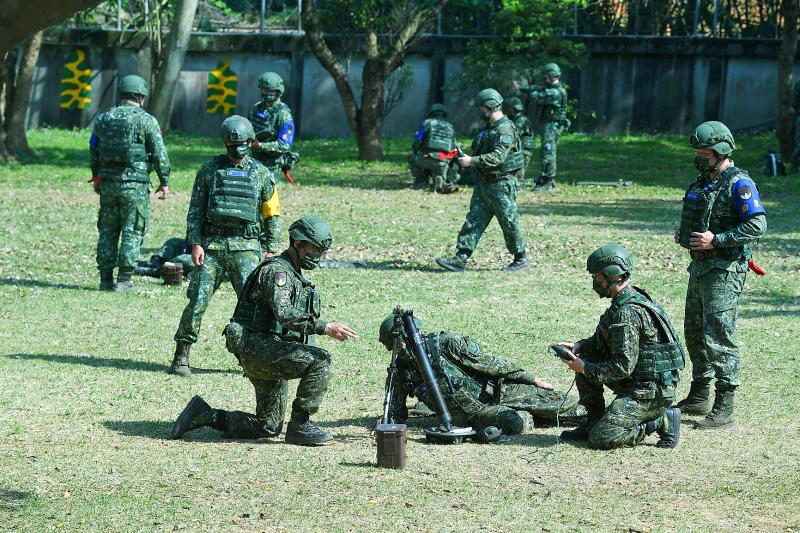Minister of National Defense Chiu Kuo-cheng (邱國正) on Saturday said he hoped the new reservist training regimen launched a week earlier would boost the country’s combat readiness.
The reserve force plays an important part in Taiwan’s defense, but the training provided previously was insufficient, because it only lasted five to seven days, Chiu said after watching reservists conduct a drill at a shooting range in New Taipei City’s Linkou District (林口).
Reservists in Taiwan were previously required to train for five to seven days, four times in eight years.

Photo: CNA
Under the new program, they would train for 14 days once a year and participate in more intensive drills.
The military would monitor the results to see if the new regimen improves the combat readiness of reservists.
Saturday’s drill, which simulated defending a beach against an attack, was performed by some of the 400 reservists who started the new 14-day training program on March 6.
Chiu was also asked whether future reservist drills might include the FIM-92 Stinger or anti-tank guided missiles, which have reportedly played a critical role in Ukraine’s resistance against Russia’s invasion.
He sidestepped the question, saying only that the military would consider training with different types of weapons that are available to the military and can contribute to Taiwan’s defense.
After observing the training, President Tsai Ing-wen (蔡英文) said the situation in Ukraine showed that in addition to international support and assistance, a country’s defense depends on the unity of its people.
She said she hoped that the new training regimen would nurture a stronger sense of unity and responsibility among reservists in protecting their homeland.
The Ministry of National Defense has been heavily promoting the new scheme on social media, showing pictures of reservists carrying out live-fire drills, and being greeted by children waving flags and shouting messages of support.
The ministry plans to have about 15,000 reservists participate in the new training regimen at the 24 battalions across Taiwan this year, while another 97,000 reservists would train under the original five to seven-day program.
Additional reporting by Reuters

Taiwanese can file complaints with the Tourism Administration to report travel agencies if their activities caused termination of a person’s citizenship, Mainland Affairs Council Minister Chiu Chui-cheng (邱垂正) said yesterday, after a podcaster highlighted a case in which a person’s citizenship was canceled for receiving a single-use Chinese passport to enter Russia. The council is aware of incidents in which people who signed up through Chinese travel agencies for tours of Russia were told they could obtain Russian visas and fast-track border clearance, Chiu told reporters on the sidelines of an event in Taipei. However, the travel agencies actually applied

New measures aimed at making Taiwan more attractive to foreign professionals came into effect this month, the National Development Council said yesterday. Among the changes, international students at Taiwanese universities would be able to work in Taiwan without a work permit in the two years after they graduate, explainer materials provided by the council said. In addition, foreign nationals who graduated from one of the world’s top 200 universities within the past five years can also apply for a two-year open work permit. Previously, those graduates would have needed to apply for a work permit using point-based criteria or have a Taiwanese company

The Shilin District Prosecutors’ Office yesterday indicted two Taiwanese and issued a wanted notice for Pete Liu (劉作虎), founder of Shenzhen-based smartphone manufacturer OnePlus Technology Co (萬普拉斯科技), for allegedly contravening the Act Governing Relations Between the People of the Taiwan Area and the Mainland Area (臺灣地區與大陸地區人民關係條例) by poaching 70 engineers in Taiwan. Liu allegedly traveled to Taiwan at the end of 2014 and met with a Taiwanese man surnamed Lin (林) to discuss establishing a mobile software research and development (R&D) team in Taiwan, prosecutors said. Without approval from the government, Lin, following Liu’s instructions, recruited more than 70 software

Chinese spouse and influencer Guan Guan’s (關關) residency permit has been revoked for repeatedly posting pro-China videos that threaten national security, the National Immigration Agency confirmed today. Guan Guan has said many controversial statements in her videos posted to Douyin (抖音), including “the red flag will soon be painted all over Taiwan” and “Taiwan is an inseparable part of China,” and expressing hope for expedited reunification. The agency last year received multiple reports alleging that Guan Guan had advocated for armed reunification. After verifying the reports, the agency last month issued a notice requiring her to appear and explain her actions. Guan